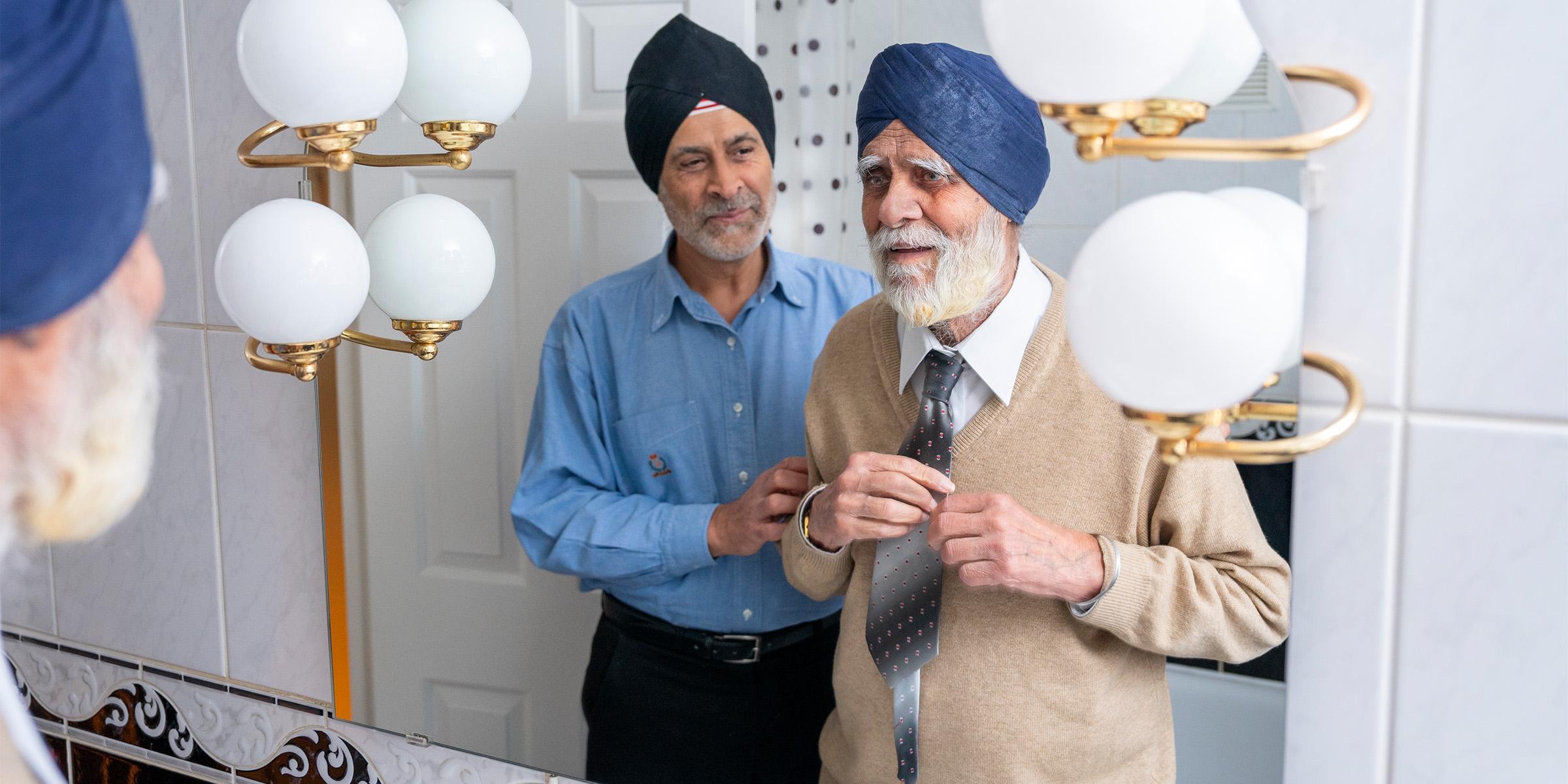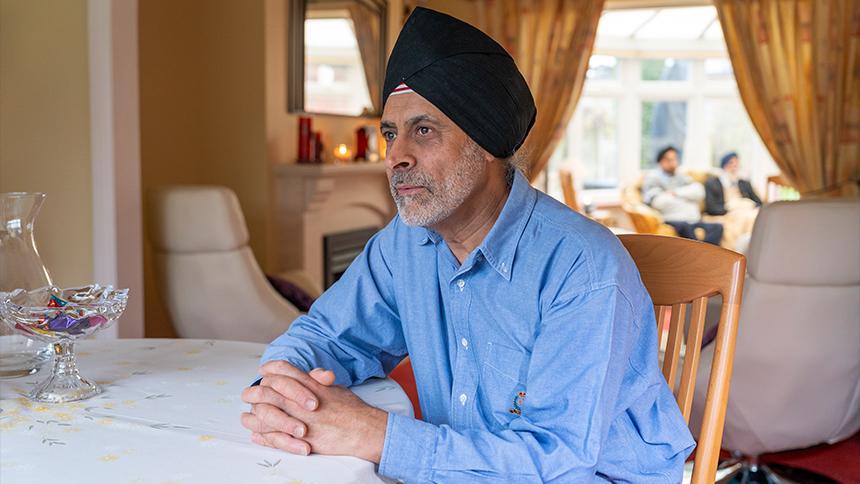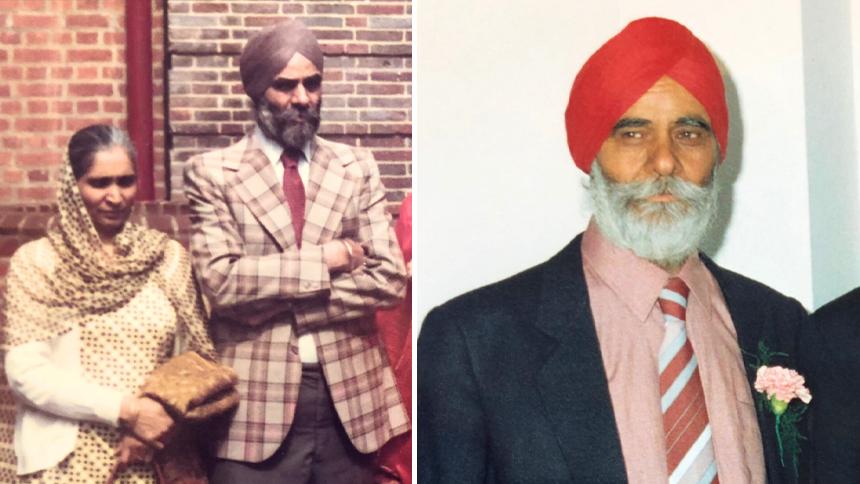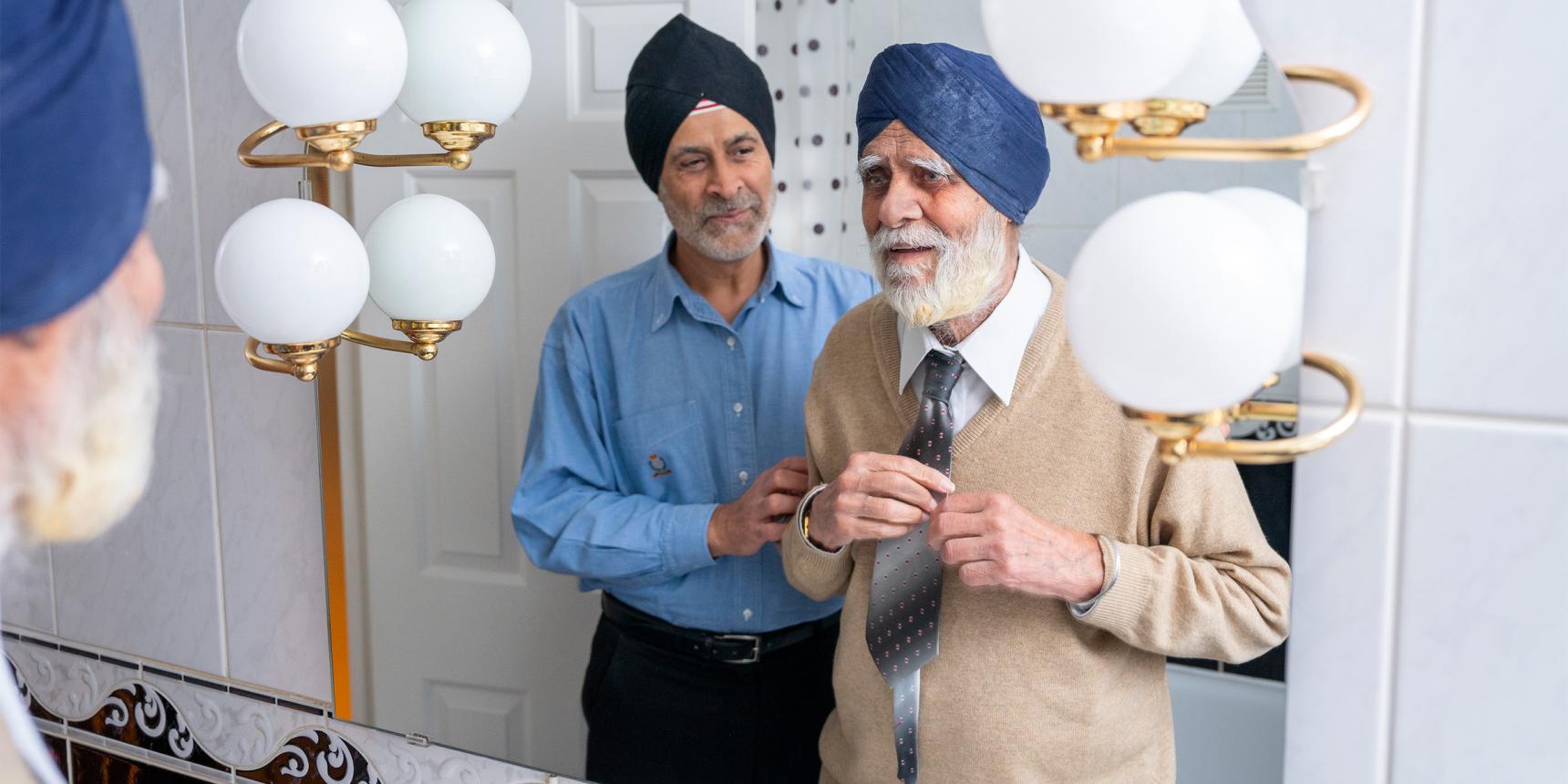
Real stories
My experience of caring for two parents with dementia
Dalwinder, in west London, shares his experience of caring for his mum and dad, who were diagnosed with dementia within months of each other.
Before both his parents were diagnosed with dementia, Dalwinder in west London, didn’t know a lot about the condition.
‘When it doesn’t affect you, you don’t really pay much attention to it, do you? I didn’t really know much about it at all.’
But after supporting both his parents, Dalwinder says that being a carer has become all-consuming.
‘I wouldn’t wish dementia on anyone. It’s so hard watching a person go downhill like this.’

Family life before dementia
These days Dalwinder’s dad Gurdev, 96, is quiet and withdrawn. He doesn’t often leave the home that he and his son share.
But he used to be the life and soul, always on the move, says Dalwinder.
Before all this, he wouldn’t let you talk. Now, he just wants peace and quiet.
‘He enjoyed walking eight to 10 miles a day and visiting people he knew.
‘I’d often get calls from friends saying, “What’s your dad doing in Harrow?” which is miles away.
‘Sometimes you wouldn’t see him until he came home for dinner at six or seven in the evening.’
Busy and sociable parents
Born in the Punjab in northwestern India, Gurdev moved to East Africa to work in the 1950s, working in customs.
He eventually settled with his wife Ranjit in Tanzania, where Dalwinder and his four sisters were born.
The family moved to the UK in 1973 because of Gurdev’s work.
Dalwinder, the couple’s second youngest child, says theirs was a busy and sociable home.
‘My mum was the centre of the family. She was always on the move. She was tiny compared to Dad but a powerhouse.
She was funny, chatty and always very jovial.
‘She loved hosting family celebrations and I have lots of memories of big parties for new year, birthdays and weddings.
‘My parents were married for over 70 years and did everything together, including watching lots of EastEnders. I used to say to my friends, “If you ever miss an episode, just give me a call, I’ll give you a Punjabi version!”’

Dalwinder's parents, Ranjit and Gurdev.
Impact of Covid on the family
Dalwinder says the pandemic was a difficult time for his sociable family. It was also a turning point for his parents’ health.
‘We followed the rules. We all stayed inside a lot more, which meant that we were interacting less and Dad couldn’t stay physically fit with his walks.’
Dalwinder and his sisters also noticed subtle changes in both Ranjit and Gurdev.
Mum’s situation got worse before Dad’s – she was having a lot of problems, one thing after another.
‘She couldn’t pick something up with a spoon and put it in her mouth. It was like she was aiming for her ears.
‘I gave her a glass of orange juice once and she just dropped it straight on the floor, smashing the glass.’
Deprived of his treasured walks, Gurdev’s physical strength declined and when he did start going out more, the family noticed his walking had changed.
‘He couldn’t seem to walk in a straight line and was struggling to go any distance.’
Dalwinder also noticed his dad having problems with his memory.
‘When we were sitting in traffic, he would say “that car’s always in front of us!” pointing at the car in front.
‘But he would forget that we hadn’t moved and that it was the same car for that reason.’
Mum’s dementia diagnosis
Worried about his mum’s health, Dalwinder took her to the family GP, who then referred her to a memory clinic.
Ranjit spoke mainly in Punjabi, so Dalwinder had to explain everything the healthcare professionals were saying.
Ranjit was diagnosed with vascular dementia.
Just a few months later, at the same memory clinic and with the same specialist, Gurdev was diagnosed with mixed dementia – Alzheimer’s disease and vascular dementia.
It was an overwhelming and confusing time.
‘They handed us loads of printed information at the memory clinic and we tried to make sense of it all.’
Sadly, in September 2022, only three months after receiving her diagnosis, Ranjit died following a bleed on her brain.
Adjusting to life without the family’s matriarch has been incredibly difficult, says Dalwinder. Grief has also noticeably affected his dad’s dementia symptoms.
‘He feels intense loneliness, but he forgets or gets confused about her not being there.
He often cries and asks me if Mum has passed away.
‘We think his grief has made his dementia much worse.’
Full-time dementia carer
Dalwinder’s once busy life and his career in freight forwarding are now paused while he cares full-time for his dad.
‘I’ve got to watch Dad’s every step now.
It’s becoming increasingly difficult to ensure he gets everything he needs.
Apart from help from three sisters who live not too far away, Dalwinder cares for his dad’s every need. This includes everything from getting dressed to taking his medication and going to appointments.
Dalwinder feels a sense of duty after his parents’ care in bringing him up. However, he acknowledges that being a carer is ‘challenging, tiring and lonely’ at times.
Support from Alzheimer’s Society
A lifeline came when he first reached out to Alzheimer’s Society after seeing a TV advert.
He describes Gurdev’s Dementia Adviser Madhuri as a ‘gem’.
‘She’s really helpful. I mean if I need any help and advice, I’ll always ring her and she’ll point me in the right direction.
‘For example, she’s helped me with voice activation tech – putting speakers around the house.
‘At one point Dad was frightened of getting in the bath. Madhuri explained about the fear of falling and how dementia has affected his perception of things and we managed to work out a solution.’
Madhuri is also an emotional support.
She’s really good with him and he loves seeing her.
Extra respite also came when Dalwinder started taking his dad to monthly peer support meetings at the Sikh temple.
‘They make it fun, with quizzes, general conversation and a tasty meal.
‘I get to meet other carers and Dad gets to talk about old times with other people from the Sikh community who have dementia. Suddenly, all the old memories from decades ago come flooding back to him.’

Later stages of dementia
Sadly, it’s rare for Gurdev to leave the house now.
‘The big challenges we have at the moment are getting Dad up and dressed. He used to be so active and now he just wants to stay in and sleep.
‘He used to have a great appetite too, but he doesn’t eat much now and has become really fussy, frequently refusing the things I cook.’
Dalwinder admits his own wellbeing has been affected by being a full-time carer. It’s hard to find the time and headspace to look after himself.
All his passions, such as cycling and travel, are on ice.
‘I don’t get any exercise, apart from gardening and doing chores around the house.’
But he tries to stay upbeat, taking energy from his wider family, friends and a new relationship.
He also has some sacred time to himself at the end of an exhausting day.
To me, what is relaxing is watching a movie. When Dad has gone to bed and I’ve done all my chores and spoken with my girlfriend, I find sitting in front of the telly is really relaxing.
‘You start getting into something and you forget the world.
‘You just engross yourself in that film and you’ve forgotten everything.’
Tackling taboos about dementia
Having previously not known anything about dementia, Dalwinder’s experience as a carer means he has valuable advice for other people.
‘Dementia’s still a taboo, particularly in Asian culture but really, what is there to be ashamed of?
Being open and having honest conversations is the way forward because only then can you access help and support.
Dalwinder’s philosophy is to take every day as it comes.
‘My friend sent me something the other day that I thought was quite important.
‘It was a motivational quote that said, “Hope is the power that gives the person confidence to step out and try.”
‘Well, we all live in hope. That’s the bottom line.’


comments